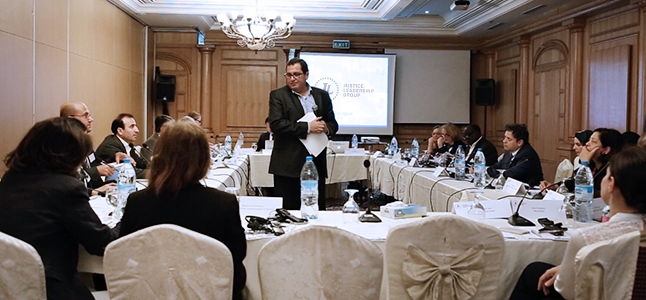The blog was originally published on JLG website
In response to the major justice leadership challenges ahead in countries in the Arab world, such as Syria, Iraq, Libya, and Yemen, where rule of law needs to be rebuilt when a viable peace process gets underway, the Justice Leadership Group held a Justice Dialogue in Amman, Jordan.
This forward-looking dialogue on what kind of leadership is needed to rebuild the justice system in the region, with special focus on Syria, took place in the framework of the Annual Meeting of the Justice Leadership Group in Jordan on 3 September and was chaired by Dr Salaheddin al-Bashir, founding member of the Justice Leadership Group and former Minister of Justice of Jordan. Bringing together distinguished justice leaders from the region, among others the Chief Justice of Iraq, H.E. Mr Medhat al-Mahmoud, as well as high-level representatives of UN Agencies and the EU and representatives of local NGOs, the Justice Dialogue provided the first opportunity to initiate the conversation on post conflict rule of law building in Syria and how to best promote justice leadership in the region.
There is an urgent need to find innovative solutions to address the tremendous justice challenges ahead in Syria. Therefore, it is crucial to think ahead about what will be required to rebuild rule of law when a peace settlement is achieved and what can be done now to prepare this, and to provide the necessary building blocks for post conflict rule of law building. The Justice Leadership Group initiated this agenda setting process by facilitating the first of a series of Justice Dialogues on Syria, which focused on identifying key challenges for justice change, what kind of leadership is required to build the rule of law, and what can be learned from justice leaders in the region and the challenges they face.
The dialogue started with the identification of key challenges for justice change in Syria and the region, such as safety and security. Based on earlier experiences, we know that in post conflict situations people are prone to suffer from land and family disputes, limited freedom of movement, and restitution and registration issues. It was highlighted that these and other urgent justice needs of citizens should serve as the starting point. As regards justice leadership, participants recognized that leadership could play a crucial role in organizing ownership for justice change processes in Syria and the region. There was a broad consensus that it is needed to stimulate transitional leadership that pulls together reconciliation, peace, and stability. For this, education is crucial. Participants also agreed that it is highly important to identify, empower, support and connect Syrian justice leaders, and to start this process well in advance.
Some other issues that were highlighted are: constitution-building does not necessarily come first; accountability for past atrocities is essential for development and stability; it is needed to create incentives that make a rule of law culture shift possible; development, human rights and justice communities must work hand in hand; and it is necessary to prioritize gender-based violence. Moreover, it was concluded that since previous international efforts to rebuild the rule of law in other countries, e.g. Bosnia, Kosovo, Afghanistan, Somalia, and DRC, have been mostly unsuccessful, and since rule of law building is the most challenging element of state building, new approaches and innovative procedures are urgently needed.
The Justice Leadership Group was requested to facilitate this necessary agenda setting process, by holding a further dialogue on Syria with local representation and key stakeholders, in order to come up with concrete, homemade and innovative solutions for the urgent needs of citizens in a post conflict situation as well as a roadmap how to implement these. The Group is pleased to announce that it agrees to facilitate this Justice Dialogue series on rebuilding the rule of law in Syria, resulting in a roadmap for transitional justice in Syria.


